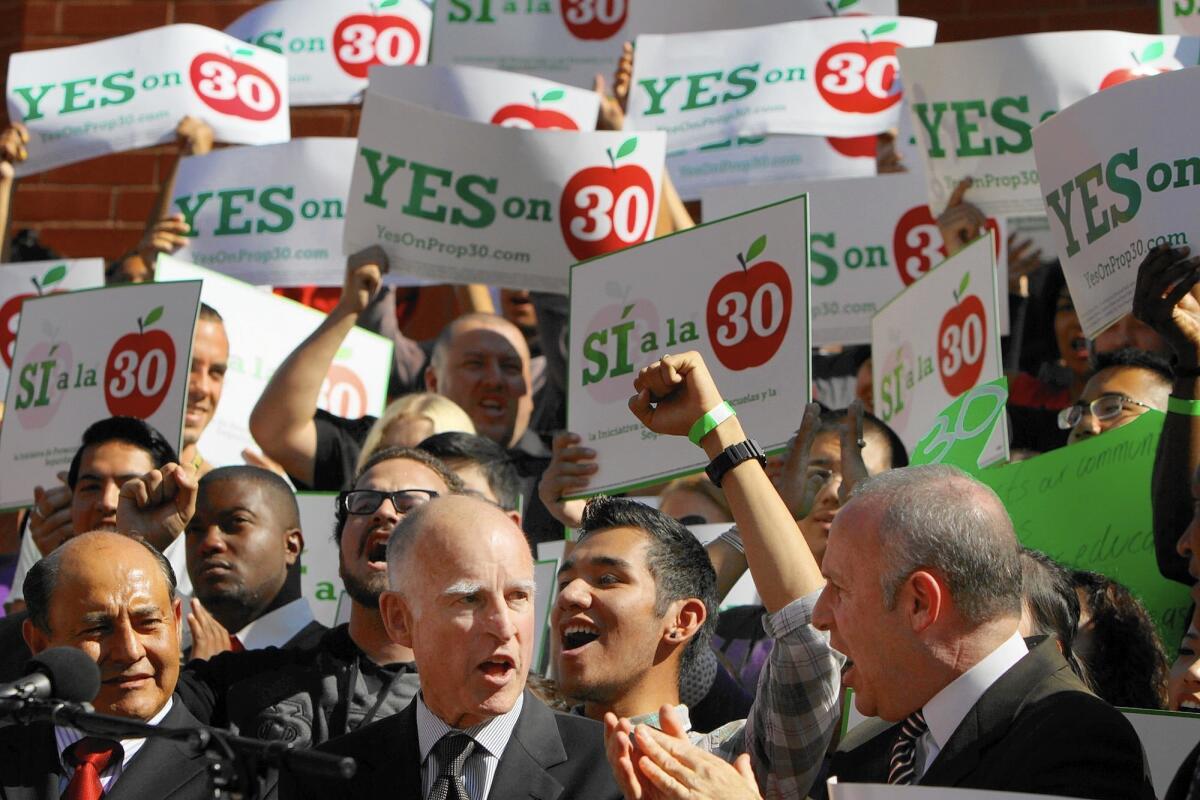Capitol Journal: Tax hike made sense during recession, but no longer

- Share via
in sacramento — If Gov. Jerry Brown’s revised budget plan proved anything last week, it is that his 2012 tax increase should quietly fade into history as he promised.
There’s no justification for continuing to sock the highest income earners — the people who can most easily move to a low-tax state — when Sacramento is wallowing in surplus money.
The governor’s budget revision showed that general fund revenue for the fiscal year starting July 1 is projected to be $6.7 billion higher than anticipated in January. For the current budget year, tax receipts are running $5.6 billion higher than predicted when he signed the spending plan last June.
Yet, the teachers union and some liberal Democrats — not Brown — are plotting to extend the tax hike that was advertised to voters as temporary.
Three years ago, state government was still reeling from the job-killing recession — or Sacramento thought it was — and Brown and public employee unions persuaded voters to pass the Proposition 30 tax hike. It made sense then.
Now the treasury is overflowing, principally from money generated by Prop. 30. The tax measure is expected to produce $8.3 billion of the $115-billion general fund revenue for the next budget year. For the current budget, it’s pumping in $8 billion.
A small quarter-cent sales tax increase is scheduled to expire at the end of 2016. A hefty income tax hike on the wealthy, raising top rates to 13.3% from 10.3%, is supposed to end after 2018.
The California Teachers Assn., in particular, savors the tax windfall and privately has been mapping strategy for a ballot initiative to extend some form of Prop.30.
You may have noticed that K-12 schools were the biggest beneficiaries of Brown’s revised budget, basically because of constitutional funding guarantees, with spending per student rising by $3,000.
Other public employee unions have different taxing ideas. Some are targeting the property tax on commercial buildings. That would require tinkering with Prop. 13, which many voters consider sacred.
Brown hasn’t taken a position on any tax proposal except Prop. 30, which he told voters would be temporary. So he’s against extending it.
And with surplus money rolling in, good luck trying to make a case for keeping those tax rates in the stratosphere without the governor’s support.
Brown’s budget revision also made another thing clear, or should have: There’s a pressing need for real tax reform. We need a more stable tax system, one that doesn’t exaggerate the natural ups and downs of the economy.
California government is too dependent on the unreliable super-wealthy and their seesawing investments, plus an outdated sales tax that exempts the new economy: services.
The nonpartisan legislative analyst warned about the erratic tax stream Friday in assessing Brown’s budget.
“We are clearly on the upward slope of the state’s revenue roller coaster,” Legislative Analyst Mac Taylor wrote. “But just as the state’s revenue picture has improved significantly over just a few months, it can just as easily reverse course with a stock market or economic downturn.... Such slumps can occur with little warning.”
Brown unintentionally made a case for tax reform — broadening the base to collect from more people and sources — while unveiling his budget revision. But he shied away from advocating it. In fact, he pooh-poohed the possibility.
“We know a recession is on the way, it’s around the corner,” the governor told reporters. “Is it next year? Is it four years from now?.... And when it comes and you get these [spending] cutbacks, who’s cut back? Schoolteachers, people on welfare, all sorts of programs. The University of California. It’s inevitable.”
A more secure tax system would cushion the next downturn. But Brown made light of the notion. Asked if he had thought about it, the governor replied:
“Well, I’ve thought about the big alternative, which is taxing yoga lessons and education and accountants’ fees and lawyers’ fees and advertising, and I always say, ‘Is that real? Is it possible?’ I don’t see the path forward.”
But, Brown continued, Sen. Bob Hertzberg (D-Van Nuys) “is generating a lot of heat and maybe some light will come. I certainly have an open mind, but it looks difficult.... Very difficult.”
Hertzberg is pushing reform — but not, as Brown suggested, taxing education. “He doesn’t know what I’m proposing,” Hertzberg told me. Neither does the senator, entirely. He’s working on it, trying to build a coalition. “I will light the pathway.”
The governor added that when people see the income gap between rich and poor, and there’s talk of lowering the highest tax rates while burdening “the ordinary folk out there, that may be logical [to] some green-eyeshade accountants, but I don’t know from a political point of view that it’s very viable.”
“He’s the greatest one-liner in the world,” Hertzberg said. “But I think he’s also a brilliant guy, and once he focuses on it, he’ll get it.”
Here’s what Brown needs to get, Hertzberg added: In 2008, California’s domestic product fell 3.7%. But state tax revenue plummeted 23%.
“Come on, guys. We have to fix that problem,” the former Assembly speaker said. “I’m trying to find an honest, realistic way to run a government in this new economy.”
But that would require political courage. And there’s rarely a surplus of that in Sacramento.
Twitter: @LATimesSkelton
More to Read
Sign up for Essential California
The most important California stories and recommendations in your inbox every morning.
You may occasionally receive promotional content from the Los Angeles Times.














![Vista, California-Apri 2, 2025-Hours after undergoing dental surgery a 9-year-old girl was found unresponsive in her home, officials are investigating what caused her death. On March 18, Silvanna Moreno was placed under anesthesia for a dental surgery at Dreamtime Dentistry, a dental facility that "strive[s] to be the premier office for sedation dentistry in Vitsa, CA. (Google Maps)](https://ca-times.brightspotcdn.com/dims4/default/07a58b2/2147483647/strip/true/crop/2016x1344+29+0/resize/840x560!/quality/75/?url=https%3A%2F%2Fcalifornia-times-brightspot.s3.amazonaws.com%2F78%2Ffd%2F9bbf9b62489fa209f9c67df2e472%2Fla-me-dreamtime-dentist-01.jpg)